Parenting: The most common cause of feeling tired is being tired
Teen boy tired in morning
Most Common Cause of Feeling Tired…
… is being tired!
by Gregory A. Barrett, M.D.
Begin with good physical exam
A number of years ago I developed questionnaires to be distributed to my adolescent patients and their parents at their annual checkup. They basically inquire if the child wishes to be examined with their parent or alone with the mother or father having the option of joining us afterwards, and then lists a number of common topics for possible discussion.
Of all the forty-plus subjects on the survey there is one specific concern which gets circled with an absolutely astonishing frequency, both from the teenagers themselves and their parents, and that is fatigue. This complaint also surfaces quite regularly as a stand-alone reason for scheduling an ill visit. Let me paint you a typical scenario:

A mother brings her seventeen-year-old son (let’s call him Jerry) into the office with the complaint that he is chronically tired. It is my custom in this situation to take a fairly detailed history of the child’s activities, and generally speaking the story is always pretty much the same.
Monday morning the school week begins and it’s all he can do to drag himself out of bed. Jerry can barely stay awake during his classes. After the final bell sounds, he rushes off to attend practice for whatever sport he is playing that particular season. Our hero gets home around six-thirty, eats his dinner, and then has a little downtime he spends watching a game on television or chatting with his girlfriend or his buddies on the cell phone.
He finally begins his homework at nine o’clock, finishing up and closing the books by ten-thirty or eleven. After getting ready for bed Jerry just can’t seem to settle. He starts to toss and turn, his frustration steadily mounting as he tries without success to fall asleep. Around two A.M. he finally dozes off only to be cruelly jarred into wakefulness by his i-Pod radio alarm less than five hours later.
The pattern repeats itself throughout the remainder of the week. When the weekend at last arrives, he sleeps in until noon or so both days. He begins to gradually recover and feels somewhat better. However, when he tries to go to bed at a reasonable time on Sunday evening, he finds himself once more unable to sleep. Monday morning comes calling, he crawls out of bed rubbing his eyes and yawning, he is already exhausted, and the new week has only just begun. This has been going on for several months.
At the completion of the physical exam, which is inevitably entirely unremarkable in a case such as this, his mom will look at me with worried eyes and ask, “What do you think is wrong, Doctor? Why is Jerry so exhausted?”
To relieve parental anxiety (typically up in the stratosphere in these situations) I often feel compelled to order some basic lab tests, primarily for reassurance, and with rare exceptions they all come back normal. So, why is he tired?
Yeah, yeah, as the kids used to say, “Duh,” but you would be amazed at how often parents are completely mystified by this concept.
Let me explain. What is wrong with Jerry is the condition I have dubbed: The Disordered Sleep Pattern of Adolescence
What’s Your Plan?
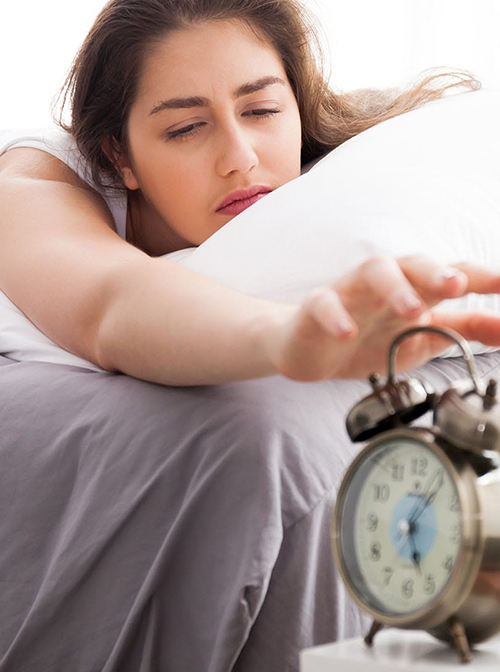
Here’s how it works…. Sleeping in on Saturday mornings (and ideally Sunday mornings, too, unless the parents are really diehard church attendees and won’t allow it) is considered a holy rite to the typical teenager. Now there is no way on earth adolescents can roll out of the sack in the late morning or early afternoon on weekends and have any hope whatsoever of being able to fall asleep later that evening at a reasonable time. No way, a physical impossibility. Why, you ask? BECAUSE THEY ARE NOT TIRED!
I mean, how could anyone expect otherwise? So, when that evil Monday morning alarm rings Jerry is already feeling fatigued from lack of sleep the night before, he drags his tired carcass through classes and after-school activities, and he keeps up with his busy schedule as best he can while growing increasingly exhausted and run down by the day.
Then mercifully the weekend arrives, and he is finally able to catch up on his sleep. Feeling somewhat revitalized, he’s able to climb back on the bicycle of life and start pedaling the wheel once again come Monday morning. But Jerry complains constantly about feeling tired. And, do you want to know something? He is!
Here’s the good news: there is a cure. And the treatment is truly magnificent in its simplicity. All that is needed to break the pattern and resolve the fatigue is to set the alarm clock for the same exact time seven days a week. Yes, even on Saturday and Sundays. However, therein lies the bad news, that in spite of the profound misery associated with chronic exhaustion almost no adolescent ever agrees to the remedy.
“Do you mean you’re telling me that I have to wake up at six-thirty in the morning, even on weekends?” the teenager with the dark circles under her eyes will inquire, clearly aghast at this absolutely preposterous suggestion and openly questioning whether her formerly wise, respected, and trusted pediatrician has completely lost his mind. Even though I guarantee her that if my advice is followed she will have no trouble whatsoever falling asleep a whole lot earlier and a whole lot easier, invariably she will respond politely, “Uhh, no thanks.”
Sleep is inevitable

And to that I say, okay, fine. Adolescents must choose between maintaining their current schedule and feeling tired as an unavoidable repercussion or setting the alarm on weekends and taking the cure. The decision is solely up to them. If they would rather live with being exhausted rather than changing their schedule, then so be it. But they must realize that the fatigue they feel during the week is totally of their own choosing.
The truth is these kids are actually getting enough sleep, they’re just getting it in irregular amounts and at odd times. Sleeping is a bodily function that in the end cannot be ignored. If a person becomes tired enough, they will fall down face first in a gutter at high noon and snooze. Their brain and their body will demand it.
The most common underlying problem with being able to fall asleep in general is anxiety, and the most common source of anxiety is worrying about being able to sleep. The child can’t fall asleep because they are worried about falling asleep. Ironic, huh? I tell my patients there are two things in life they are categorically not allowed to worry about—breathing and sleeping.
What is the worst possible consequence of a bad night’s sleep, anyway? The obvious answer is that one might feel tired the following day. That’s it. And the more tired one becomes the easier it will be to sleep, if not the next night, then surely the following. Eventually sleep happens. It always does. So don’t fight fatigue, embrace it. If you’re awake at night then, hey, try to make constructive use of the time. Read, write, listen to music, daydream, whatever, but don’t worry about it. Relax…sooner or later everybody sleeps.
Blame it on the Moon
In my opinion the principal blame for the fatigue so commonly present in adolescents is actually the moon, and I’m not talking about astrology here. The problem lies in the fact that our lunar friend reappears at the same place in the sky every twenty-four hours.
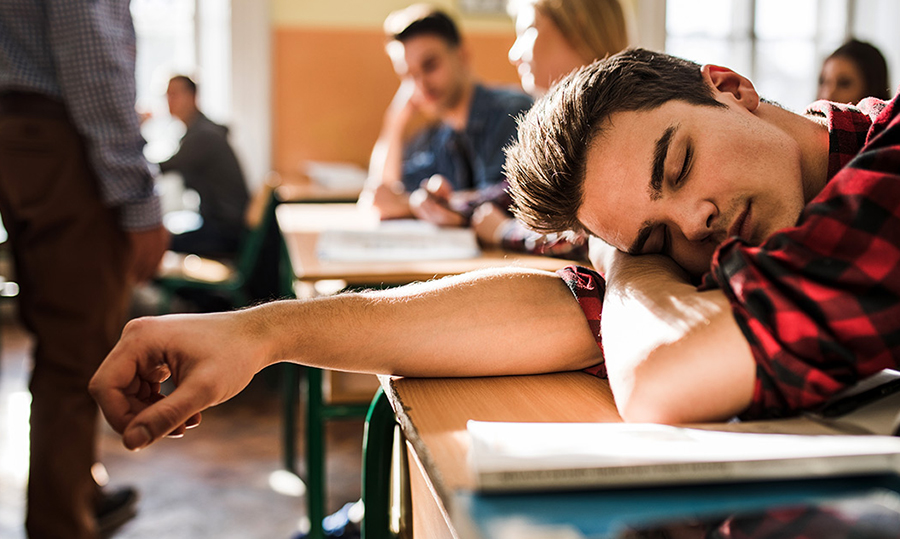
Seriously, think about it for a second. If the moon would be so kind as to just take an additional couple of hours to arrive again the typical teenager would then be able to play her video games, instant message friends, go to school, hang around the mall, talk on the cell phone, surf the Internet, eat non-healthy foods, watch favorite TV shows, send and receive a couple hundred texts, practice her instrument and/or her sport, AND still have time to get sufficient rest.
That one day in the fall when we get to turn back our clocks is pretty sweet, isn’t it? However, those other three hundred and sixty-four can be pretty darned rough on our adolescent children. But, unfortunately, there’s nothing to be done. We are stuck with the twenty-four-hour day established by the lunar orbit, and the speed of the earth’s rotation cannot be altered (darn it). So with all of their activities, all of the demands on their time, and all of the stuff that’s happening in their lives something has to give, and what is sacrificed most commonly is a decent night’s sleep.
By the way, I have never really bought into the idea that if we started school an hour or two later everything would be hunky dory. I estimate it would only take the typical teenager about two weeks before they would be staying up until four A.M. and having an impossible time trying to get out of bed to rise and shine for that “brutal” ten o’clock first morning class. It just won’t happen. I’ve been around long enough to know how adaptive kids would be to the new schedule.
There is an alternative variation of “fatigue” we encounter not uncommonly in pediatrics. Let’s take a look at another example:
“Benjamin” is brought into the office by his father with the chief complaint of insomnia. He is one of those rudderless 19-year-old kids who has graduated from high school but has not yet found himself. Ben lives at home, is unemployed and currently not really seeking a job in any active fashion, and has only some vague, ill-defined life plan of maybe attending a college someday in the future.
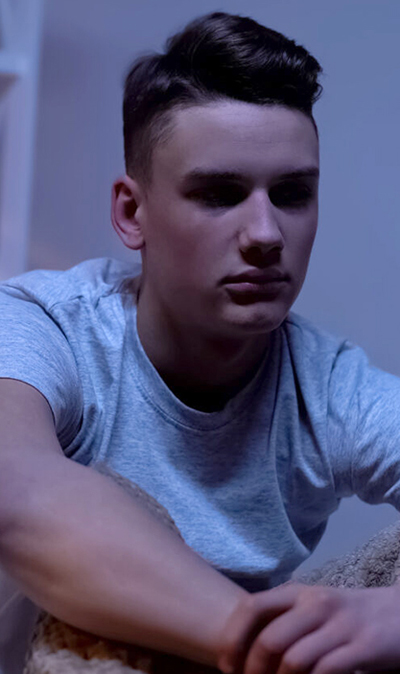
The concern of the parent is that he can’t get to sleep at night. Ben declares that he is a “night owl.” He kind of drags himself through the early evening and starts to feel more energetic towards midnight. Night after night he stays up playing games on the computer or listening to his music until nearly sunrise.
“When does Ben get out of bed?” I inquire.
“Usually around four o’clock,” answers the parent.
“Four P.M?”
“Yes.”
“Let me see if I have this right. He falls asleep at six in the morning, and he doesn’t wake up until four in the afternoon?”
“Uh-huh.”
“Well, that is ten hours of sleep a day.”
“I reckon that’s true.”
“So, he’s getting plenty of sleep.”
“Yeah, he’s sleeping plenty. That’s not the problem.”
“Then what exactly is the problem?”
“The problem is that he can’t get to sleep at night. You know, because of the insomnia….”
Sleeping Pills
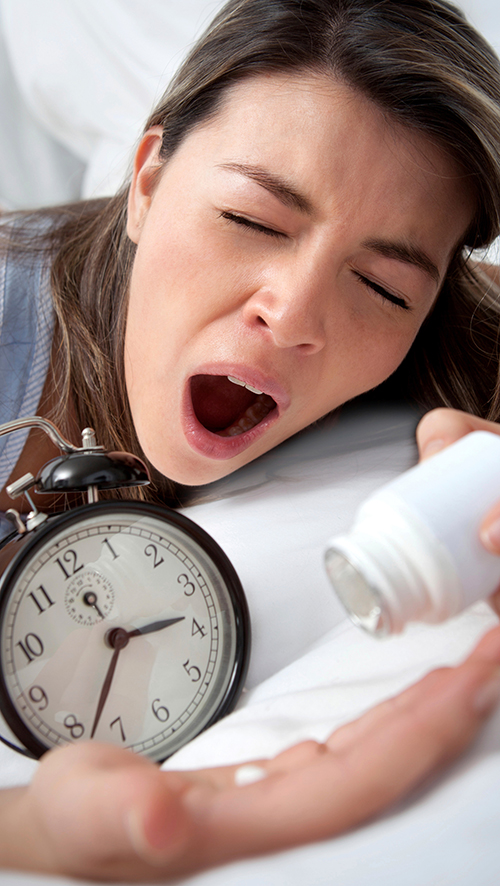
Pediatricians are often asked for a prescription to assist the teen in getting to sleep. There are a couple of medicines which may aid somewhat in this regard, but kids generally find them fairly unsatisfactory. And the scenario described above is absolutely not a situation where sleep medication would be indicated.
It goes without saying that, other than a general anesthetic being administered (and recent headline events have reinforced what a crazy and dangerous idea that is), there is no drug in the world which will allow a person who has just awakened from ten hours of uninterrupted slumbers only six hours previously to fall back asleep. Benjamin has problems, most certainly. However, insomnia is not one of them. He is in dire need of getting assistance in re-structuring his schedule and receiving some serious life coaching, but he definitely does not need a sleeping pill.
My own son was one of those kids who always stayed up later in the evening than he should, and then as a natural consequence had chronic difficulty arising the following day. He finally had a revelation—of sorts, that is—during a family vacation we took from our home in Ohio to northern California to celebrate his older sister’s high school graduation.
“Hey, I think I’ve finally figured out my problem,” Keith announced brightly one morning over breakfast in San Francisco.
“Oh, yeah? Which one is that?” I asked.
“You know, the one about how I always seem to have trouble getting to bed at night.”
“Yes?”
“Yeah. You see, I think I’ve been living in the wrong time zone,” he said, nodding his head as he shoveled scrambled eggs into his mouth. “It’s really been a whole lot easier for me ever since we flew out here. Instead of staying up until two in the morning—you know, like I do at home—heck, by eleven to eleven-thirty, I’m pretty much done for the day.”
I stared at him dumbly.
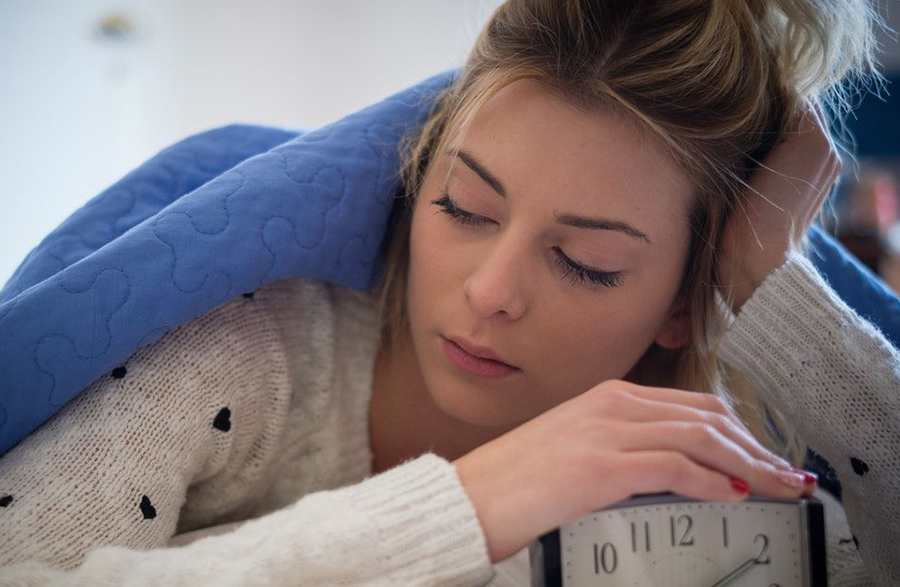
“What do you think, Dad?”
Sigh.
Fell Asleep Studying
If you ever find yourself wondering why your adolescent is always complaining about feeling exhausted, I bet the answer isn’t nearly as complicated as you would imagine. Odds are he or she is simply tired. And isn’t it surprising how often in life the obvious answer turns out to be the correct one?
Pleasant dreams.
☤


